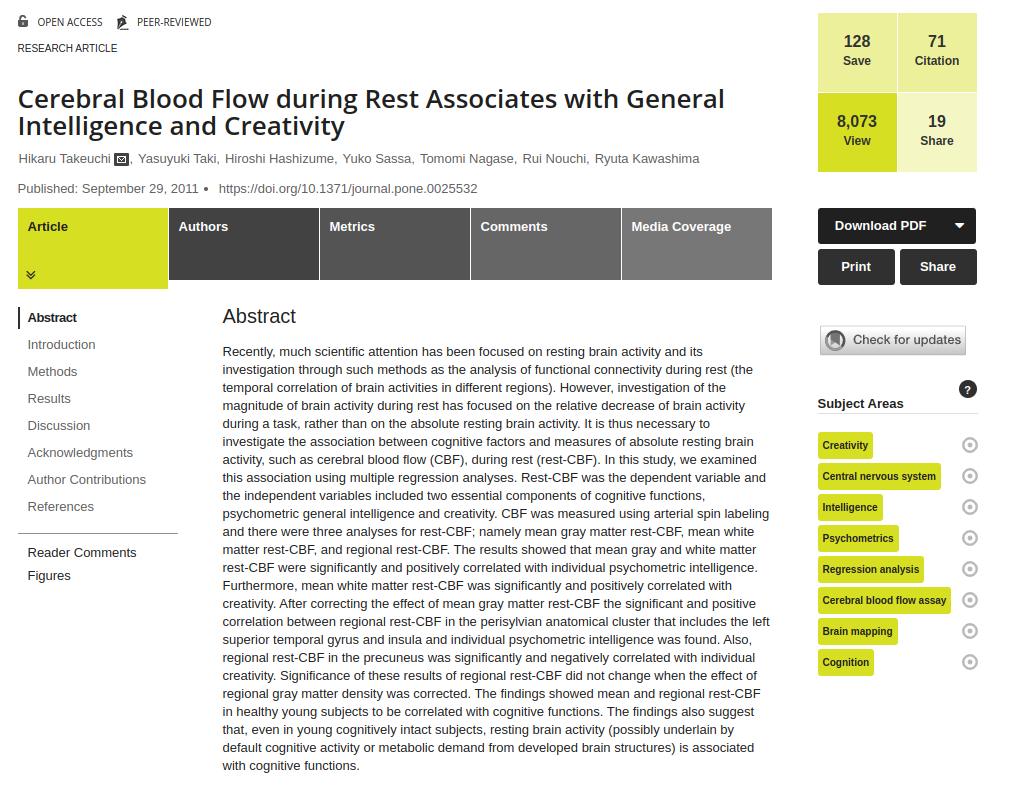Recently, much scientific attention has been focused on resting brain activity and its investigation through such methods as the analysis of functional connectivity during rest (the temporal correlation of brain activities in different regions). However, investigation of the magnitude of brain activity during rest has focused on the relative decrease of brain activity during a task, rather than on the absolute resting brain activity. It is thus necessary to investigate the association between cognitive factors and measures of absolute resting brain activity, such as cerebral blood flow (CBF), during rest (rest-CBF). In this study, we examined this association using multiple regression analyses. Rest-CBF was the dependent variable and the independent variables included two essential components of cognitive functions, psychometric general intelligence and creativity. CBF was measured using arterial spin labeling and there were three analyses for rest-CBF; namely mean gray matter rest-CBF, mean white matter rest-CBF, and regional rest-CBF. The results showed that mean gray and white matter rest-CBF were significantly and positively correlated with individual psychometric intelligence. Furthermore, mean white matter rest-CBF was significantly and positively correlated with creativity. After correcting the effect of mean gray matter rest-CBF the significant and positive correlation between regional rest-CBF in the perisylvian anatomical cluster that includes the left superior temporal gyrus and insula and individual psychometric intelligence was found. Also, regional rest-CBF in the precuneus was significantly and negatively correlated with individual creativity. Significance of these results of regional rest-CBF did not change when the effect of regional gray matter density was corrected. The findings showed mean and regional rest-CBF in healthy young subjects to be correlated with cognitive functions. The findings also suggest that, even in young cognitively intact subjects, resting brain activity (possibly underlain by default cognitive activity or metabolic demand from developed brain structures) is associated with cognitive functions.
Cerebral Blood Flow during Rest Associates with General Intelligence and Creativity
Publication
PLOS ONE
Abstract
Web and Email Links
Related Listings
Journal
Behavioral Medicine
The authors compared characteristics of 1,012 outpatients completing a 10-week behavioral medicine intervention with 300 outpatients who dropped out. They administered the Symptom Checklist-90 Revised (SCL-90R) before and after the program. Patients who completed the treatment, compared with dropouts, tended to be more highly educated, married, and gainfully employed. Their pretreatment scores on the SCL-90R were significantly lower than those of the dropouts on somatization, depressi […]
Journal
American Journal of Public Health
A 12-week randomized experiment investigated the effects of daily relaxation breaks on office workers with “normal” blood pressure. Blood pressures of 126 volunteers from the corporate offices of a manufacturing firm were measured biweekly. After four weeks of baseline monitoring, volunteers were divided randomly into three groups: Group A was taught a technique for producing the relaxation response; Group B was “taught” to sit quietly; and Group C was taught nothing. Groups A and B w […]
Journal
Journal Alternative and Complementary Medicine
Objective: Mind–body practices that elicit the relaxation response (RR) have been demonstrated to reduce blood pressure (BP) in essential hypertension (HTN) and may be an adjunct to antihypertensive drug therapy. However, the molecular mechanisms by which the RR reduces BP remain undefined. Design: Genomic determinants associated with responsiveness to an 8-week RR-based mind–body intervention for lowering HTN in 13 stage 1 hypertensive patients classified as BP responders and 11 as n […]

